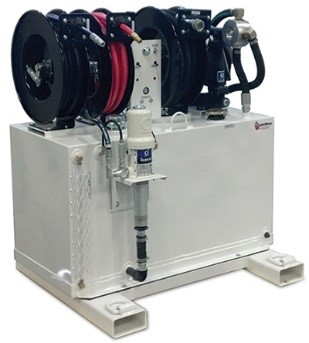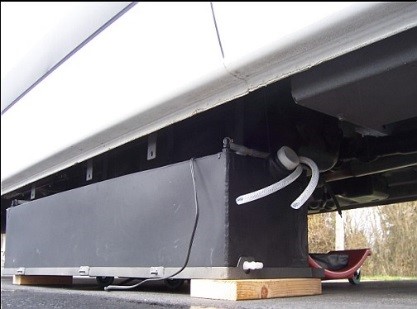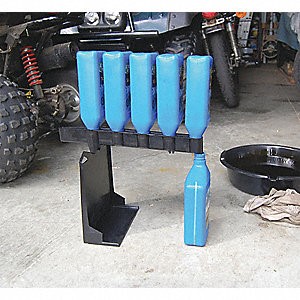This edition of MHW is all about safety. The aftermarket departments of the dealership are rife with safety concerns. There are so many safety “policy” issues I could have chosen to comment on, but many of these topics are only applicable to a portion of the dealers that read this publication. There is one area however that is common to all dealerships.
Every time a dealership puts a service van on the road, they stock the vehicle with a myriad of parts. Belts, hoses, cables, fittings, wire, light bulbs, controllers, spark plugs, alternators, starters, and filters are all neatly arranged for expeditious storage and retrieval. There are other parts however that are much more difficult, not only to store and retrieve, but also to account for accurately, and to dispose of properly.
I’m talking about maintenance fluids. Each one, even when brand new, carries with them a contamination risk. This risk is either heightened or mitigated based on how you store, handle and dispose of this material. Every dealer has this issue, and many have invested heavily in both systems and machinery to properly handle these fluids.
Bulk or Packaged?
As a dealer, the first question that must be addressed is whether the dealership will operate with bulk oil or oil that has been prepackaged for resale. It’s a topic of much debate, but the argument ultimately comes down to the dealership’s commitment to unify their processes, and invest in the infrastructure needed to deal with both new lubricants and waste oil.
Most bulk oil purchases are made through a local fuel and lubricant wholesaler. This supplier estimates the volume of the product needed and installs the tanks, stands, piping, pumps and measuring equipment necessary to properly dispense the fluids. If the volume of oil purchased is substantial (and usually it is), the supplier rents this storage and handling equipment to the dealer at no cost, provided that the dealer will continue to purchase their fluids from the wholesaler.
The benefits of this arrangement are as follows:
- The oil can be significantly less expensive than the prepackaged alternative.
- The oil dispensed is not limited by a pre-packaged container.
- There are no concerns regarding the disposal of the oil packaging (normally plastic containers).
The one obstacle of dealing with bulk oil is storage and handling. Bulk oil works extremely well when the majority of the work performed takes place at the dealership. Things get more complicated however when we have to service units at the customer’s location. In most dealerships, the vast majority of the maintenance work takes place in the field, where handling bulk oil is more cumbersome.
The picture below illustrates what many dealers have invested in, especially for their technicians who specialize in completing PM’s. The entire standalone machine sits on a removable skid that can be taken in and out of the service van by a forklift. The skid-mounted unit can then be transported to the oil storage area where waste oil is pumped out, and fresh clean oil is pumped into separated tanks. The pumping mechanism is driven by the vehicles’ electric power, and the hose reels allow for oil to be pumped directly from the tanks into the equipment, or into a premeasured container.

Another way that dealers have integrated bulk oil into field service situations is by installing onboard tanks on the service vans themselves. The photo below illustrates an example of a tank of this type. With the advent of wide-body service vehicles like the MB Sprinter, Ford Transit, and Dodge Promaster, multiple tanks can be bolted to the undercarriage of the vehicle in order to dispense or receive motor oil, transmission fluid, hydraulic fluid, and waste oil.
 Of course, there are less expensive ways of dealing with bulk oil. Some dealers simply carry multiple nominal size containers for both clean and waste oil and have their technicians dump or refill these containers on a regular basis.
Of course, there are less expensive ways of dealing with bulk oil. Some dealers simply carry multiple nominal size containers for both clean and waste oil and have their technicians dump or refill these containers on a regular basis.
Packaged Oil
The other option, of course, is purchasing pre-packaged oil. The benefit to packaged oil is that you don’t have to find a way to transport, store and dispense fluids. Packaged oil is also easier to account for from an inventory perspective. The oil is usually more expensive, but truth be told, I never heard of anyone losing a customer over the price of motor oil.
The one thing that is cumbersome however is the disposal of the containers. If you have 12 technicians, performing 6 PM’s in a given day, this creates 72 individual gallon jugs heading into your garbage dumpster every day. If you use quarts instead of gallons that number jumps to 288!
Some municipalities will allow you to recycle these containers, but they first must be COMPLETELY drained. There is always a residue of oil remaining in the bottom of the container. Getting this oil out of the bottom of the jug is not a simple task. The photo below shows a device I have seen dealers use to “drain” these containers prior to recycling. Some states won’t even let you throw them in the dumpster without ensuring that they have been fully drained.
 This can turn into a logistical and safety nightmare. The cost of investing in the equipment to handle bulk oil may seem expensive. But depending on your location, it may pale in comparison to the costs of handling and draining jugs, and/or increasing your waste stream.
This can turn into a logistical and safety nightmare. The cost of investing in the equipment to handle bulk oil may seem expensive. But depending on your location, it may pale in comparison to the costs of handling and draining jugs, and/or increasing your waste stream.
Partial containers are also difficult to deal with in a packaged oil setting. What if the crankcase holds 5 quarts of oil instead of 4? Will you carry gallons AND quarts? Will you carry only gallons and then use ¼ of the 2nd gallon for the 5th quart? How do you account for the inventory? These are all issues that make the investment in bulk oil worth considering, especially as your service department grows.
Whether you are dealing in bulk oil or packaged, risks are abundant. Be sure you assess and are aware of all of the pitfalls of going one way or the other. This includes not only the costs of machinery and handling but also the environmental impacts and the possible inventory complications. Dirty or clean, the fluids we use are a hazard. Be safe, be smart, and handle these fluids carefully.











